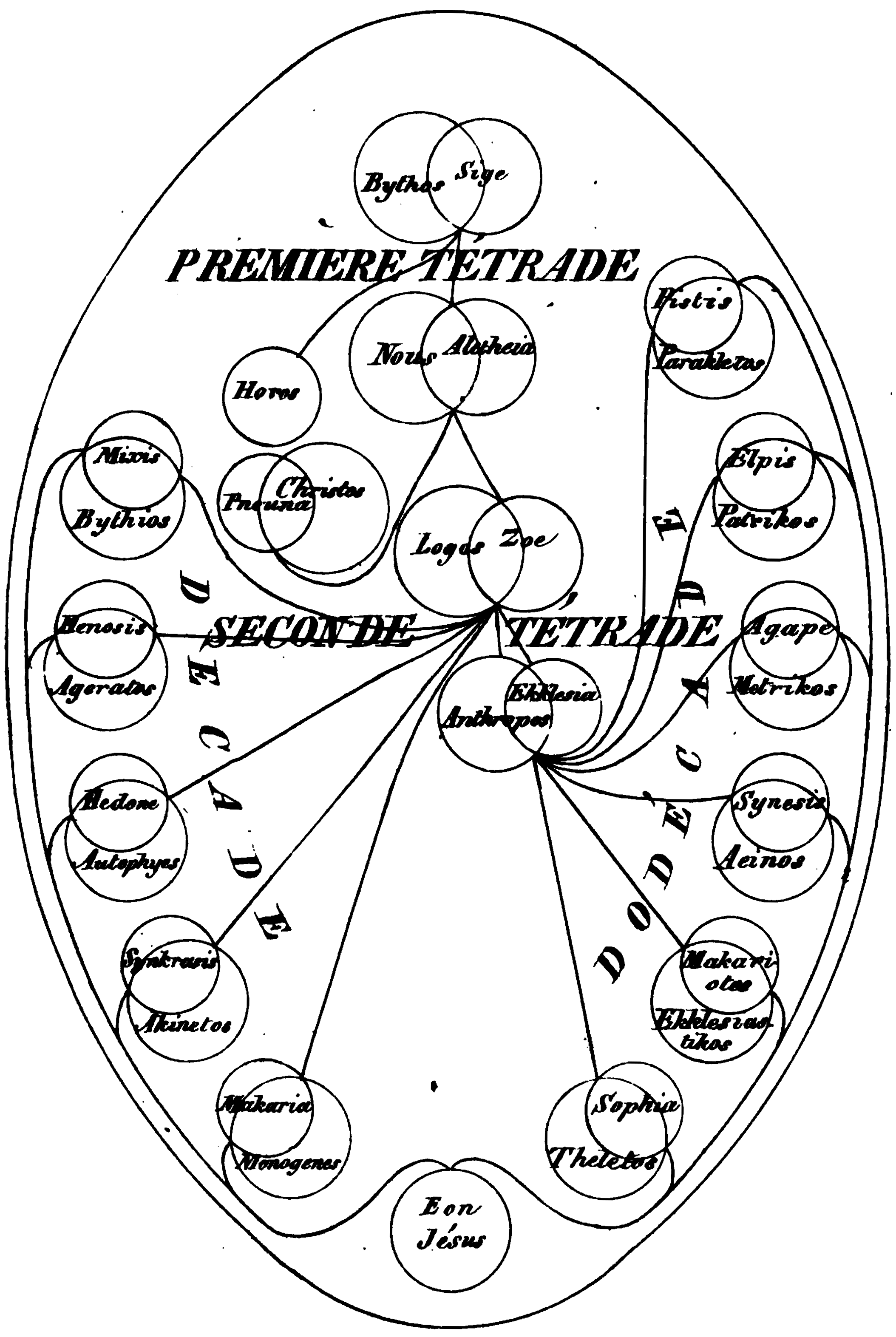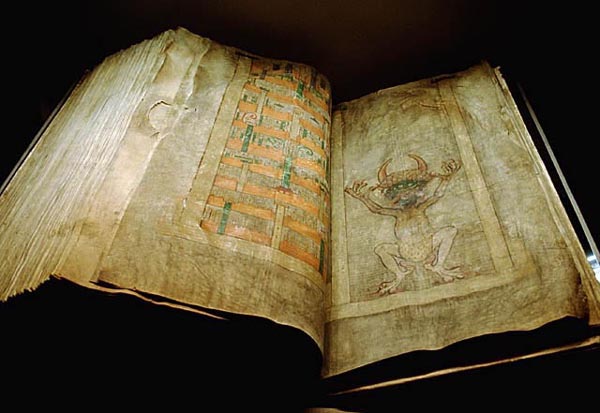|
Gnostics
Gnosticism (from grc, γνωστικός, gnōstikós, , 'having knowledge') is a collection of religious ideas and systems which coalesced in the late 1st century AD among Jewish and early Christian sects. These various groups emphasized personal spiritual knowledge (''gnosis'') above the orthodox teachings, traditions, and authority of religious institutions. Gnostic cosmogony generally presents a distinction between a supreme, hidden God and a malevolent lesser divinity (sometimes associated with the Yahweh of the Old Testament) who is responsible for creating the material universe. Consequently, Gnostics considered material existence flawed or evil, and held the principal element of salvation to be direct knowledge of the hidden divinity, attained via mystical or esoteric insight. Many Gnostic texts deal not in concepts of sin and repentance, but with illusion and enlightenment. Gnostic writings flourished among certain Christian groups in the Mediterranean world around ... [...More Info...] [...Related Items...] OR: [Wikipedia] [Google] [Baidu] |
Demiurge
In the Platonic, Neopythagorean, Middle Platonic, and Neoplatonic schools of philosophy, the demiurge () is an artisan-like figure responsible for fashioning and maintaining the physical universe. The Gnostics adopted the term ''demiurge''. Although a fashioner, the demiurge is not necessarily the same as the Creator figure in the monotheistic sense, because the demiurge itself and the material from which the demiurge fashions the universe are both considered consequences of something else. Depending on the system, they may be considered either uncreated and eternal or the product of some other entity. The word ''demiurge'' is an English word derived from ''demiurgus'', a Latinised form of the Greek or . It was originally a common noun meaning "craftsman" or "artisan", but gradually came to mean "producer", and eventually "creator". The philosophical usage and the proper noun derive from Plato's ''Timaeus'', written 360 BC, where the demiurge is presented as the crea ... [...More Info...] [...Related Items...] OR: [Wikipedia] [Google] [Baidu] |
Valentinianism
Valentinianism was one of the major Gnostic Christian movements. Founded by Valentinus in the 2nd century AD, its influence spread widely, not just within Rome but also from Northwest Africa to Egypt through to Asia Minor and Syria in the East. Later in the movement's history it broke into an Eastern and a Western school. Disciples of Valentinus continued to be active into the 4th century AD, after the Roman Emperor Theodosius I issued the Edict of Thessalonica (380 AD), which declared Nicene Christianity as the State church of the Roman Empire. The doctrine, practices and beliefs of Valentinus and the Gnostic movement that bore his name were condemned as heretical by proto-orthodox Christian leaders and scholars. Prominent Church Fathers such as Irenaeus of Lyons and Hippolytus of Rome wrote against Gnosticism. Because early church leaders encouraged the destruction of Gnostic texts, most evidence for the Valentinian theory comes from its critics and detractors, most notably ... [...More Info...] [...Related Items...] OR: [Wikipedia] [Google] [Baidu] |
Irenaeus Of Lyons
Irenaeus (; grc-gre, Εἰρηναῖος ''Eirēnaios''; c. 130 – c. 202 AD) was a Greek bishop noted for his role in guiding and expanding Christian communities in the southern regions of present-day France and, more widely, for the development of Christian theology by combating heterodox or Gnostic interpretations of Scripture as heresy and defining the Catholic and Orthodox doctrines of the Apostolic Churches. Originating from Smyrna, he had seen and heard the preaching of Polycarp, who in turn was said to have heard John the Evangelist, and thus was the last-known living connection with the Apostles. Chosen as bishop of Lugdunum, now Lyon, his best-known work is '' Against Heresies'', often cited as ''Adversus Haereses'', a refutation of gnosticism, in particular that of Valentinus. To counter the doctrines of the gnostic sects claiming secret wisdom, he offered three pillars of orthodoxy: the scriptures, the tradition handed down from the apostles, and the teachi ... [...More Info...] [...Related Items...] OR: [Wikipedia] [Google] [Baidu] |
Mandaeism
Mandaeism (Classical Mandaic: ࡌࡀࡍࡃࡀࡉࡉࡀ ; Arabic: المندائيّة ), sometimes also known as Nasoraeanism or Sabianism, is a Gnostic, monotheistic and ethnic religion. Its adherents, the Mandaeans, revere Adam, Abel, Seth, Enos, Noah, Shem, Aram, Jesus and especially John the Baptist. Mandaeans consider Adam, Seth, Noah, Shem and John the Baptist prophets with Adam being the founder of the religion and John being the greatest and final prophet. The Mandaeans speak an Eastern Aramaic language known as Mandaic. The name 'Mandaean' comes from the Aramaic ''manda'', meaning knowledge. Within the Middle East, but outside their community, the Mandaeans are more commonly known as the (singular: ), or as Sabians (, ). The term is derived from an Aramaic root related to baptism. The term Sabians derives from the mysterious religious group mentioned three times in the Quran alongside the Jews, the Christians and the Zoroastrians as a 'People of the Book', and ... [...More Info...] [...Related Items...] OR: [Wikipedia] [Google] [Baidu] |
Mandaeans
Mandaeans ( ar, المندائيون ), also known as Mandaean Sabians ( ) or simply as Sabians ( ), are an ethnoreligious group who are followers of Mandaeism. They believe that John the Baptist was the final and most important prophet. They may have been among the earliest religious groups to practice baptism, as well as among the earliest adherents of Gnosticism, a belief system of which they are the last surviving representatives today. The Mandaeans were originally native speakers of Mandaic, an Eastern Aramaic language, before they nearly all switched to Iraqi Arabic or Persian as their main language. After the invasion of Iraq by the United States and its allies in 2003, the Mandaean community of Iraq, which before the war numbered 60,000-70,000 persons, collapsed due to the rise of Islamic extremism and the absence of protection against it; with most of the community relocating to Iran, Syria and Jordan, or forming diaspora communities beyond the Middle East. Mandea ... [...More Info...] [...Related Items...] OR: [Wikipedia] [Google] [Baidu] |
Gnosis
Gnosis is the common Greek noun for knowledge ( γνῶσις, ''gnōsis'', f.). The term was used among various Hellenistic religions and philosophies in the Greco-Roman world. It is best known for its implication within Gnosticism, where it signifies a spiritual knowledge or insight into humanity's real nature as divine, leading to the deliverance of the divine spark within humanity from the constraints of earthly existence. Etymology ''Gnosis'' is a feminine Greek noun which means "knowledge" or "awareness." Liddell Scottbr>entryγνῶσις, εως, ἡ, A. seeking to know, inquiry, investigation, esp. judicial, "τὰς τῶν δικαστηρίων γ." D.18.224; "τὴν κατὰ τοῦ διαιτητοῦ γdeetr." Id.21.92, cf. 7.9, Lycurg.141; "γ. περὶ τῆς δίκης" PHib.1.92.13 (iii B. C.). 2. result of investigation, decision, PPetr.3p.118 (iii B. C.). II. knowing, knowledge, Heraclit.56; opp. ἀγνωσίη, Hp. Vict.1.23 (dub.); opp. ἄγνο ... [...More Info...] [...Related Items...] OR: [Wikipedia] [Google] [Baidu] |
Christ
Jesus, likely from he, יֵשׁוּעַ, translit=Yēšūaʿ, label=Hebrew/Aramaic ( AD 30 or 33), also referred to as Jesus Christ or Jesus of Nazareth (among other Names and titles of Jesus in the New Testament, names and titles), was a first-century Jews, Jewish preacher and religious leader; he is the central figure of Christianity, the Major religious groups, world's largest religion. Most Christians believe he is the Incarnation (Christianity), incarnation of God the Son and the awaited Messiah#Christianity, Messiah (the Christ (title), Christ) prophesied in the Hebrew Bible. Virtually all modern scholars of antiquity agree that Historicity of Jesus, Jesus existed historically. Quest for the historical Jesus, Research into the historical Jesus has yielded some uncertainty on the historical reliability of the Gospels and on how closely the Jesus portrayed in the New Testament reflects the historical Jesus, as the only detailed records of Jesus' life are contained in ... [...More Info...] [...Related Items...] OR: [Wikipedia] [Google] [Baidu] |
Valentinus (Gnostic)
Valentinus (also spelled Valentinius; – ) was the best known and, for a time, most successful early Christian Gnostic theologian. He founded his school in Rome. According to Tertullian, Valentinus was a candidate for bishop but started his own group when another was chosen. Valentinus produced a variety of writings, but only fragments survive, largely those quoted in rebuttal arguments in the works of his opponents, not enough to reconstruct his system except in broad outline. His doctrine is known only in the developed and modified form given to it by his disciples, the Valentinians. He taught that there were three kinds of people, the spiritual, psychical, and material; and that only those of a spiritual nature received the ''gnosis'' (knowledge) that allowed them to return to the divine Pleroma, while those of a psychic nature (ordinary Christians) would attain a lesser or uncertain form of salvation, and that those of a material nature were doomed to perish. Valentinu ... [...More Info...] [...Related Items...] OR: [Wikipedia] [Google] [Baidu] |
Heresy
Heresy is any belief or theory that is strongly at variance with established beliefs or customs, in particular the accepted beliefs of a church or religious organization. The term is usually used in reference to violations of important religious Religion is usually defined as a social- cultural system of designated behaviors and practices, morals, beliefs, worldviews, texts, sanctified places, prophecies, ethics, or organizations, that generally relates humanity to supernatur ... teachings, but is also used of views strongly opposed to any generally accepted ideas. A heretic is a proponent of heresy. The term is used particularly in reference to Heresy in Christianity, Christianity, Heresy in Judaism, Judaism, and Bid‘ah, Islam. In certain historical Christian, Muslim, and Jewish cultures, among others, espousing ideas deemed heretical has been (and in some cases still is) met with censure ranging from excommunication to the death penalty. Heresy is distinct ... [...More Info...] [...Related Items...] OR: [Wikipedia] [Google] [Baidu] |
Codex Tchacos P33
The codex (plural codices ) was the historical ancestor of the modern book. Instead of being composed of sheets of paper, it used sheets of vellum, papyrus, or other materials. The term ''codex'' is often used for ancient manuscript books, with handwritten contents. A codex, much like the modern book, is bound by stacking the pages and securing one set of edges by a variety of methods over the centuries, yet in a form analogous to modern bookbinding. Modern books are divided into paperback or softback and those bound with stiff boards, called hardbacks. Elaborate historical bindings are called treasure bindings. At least in the Western world, the main alternative to the paged codex format for a long document was the continuous scroll, which was the dominant form of document in the Ancient history, ancient world. Some codices are continuously folded like a concertina, in particular the Maya codices and Aztec codices, which are actually long sheets of paper or animal skin folded ... [...More Info...] [...Related Items...] OR: [Wikipedia] [Google] [Baidu] |
Sethianism
The Sethians were one of the main currents of Gnosticism during the 2nd and 3rd century CE, along with Valentinianism and Basilideanism. According to John D. Turner, it originated in the 2nd century CE as a fusion of two distinct Hellenistic Judaic philosophies and was influenced by Christianity and Middle Platonism. However, the exact origin of Sethianism is not properly understood. History Mentions The Sethians (Latin ''Sethoitae'') are first mentioned, alongside the Ophites, in the 2nd century, by Irenaeus (who was antagonistic towards gnosticism) and in Pseudo-Tertullian (Ch. 30). According to Frederik Wisse, all subsequent accounts appear to be largely dependent on Irenaeus. Hippolytus repeats information from Irenaeus. According to Epiphanius of Salamis (c. 375), Sethians were in his time found only in Egypt and Palestine, but fifty years earlier, they had been found as far away as Greater Armenia. Philaster's (4th century CE) ''Catalogue of Heresies'' places the Ophit ... [...More Info...] [...Related Items...] OR: [Wikipedia] [Google] [Baidu] |
Iraq
Iraq,; ku, عێراق, translit=Êraq officially the Republic of Iraq, '; ku, کۆماری عێراق, translit=Komarî Êraq is a country in Western Asia. It is bordered by Turkey to Iraq–Turkey border, the north, Iran to Iran–Iraq border, the east, the Persian Gulf and Kuwait to the southeast, Saudi Arabia to the south, Jordan to Iraq–Jordan border, the southwest and Syria to Iraq–Syria border, the west. The Capital city, capital and largest city is Baghdad. Iraq is home to diverse ethnic groups including Iraqi Arabs, Kurds, Iraqi Turkmen, Turkmens, Assyrian people, Assyrians, Armenians in Iraq, Armenians, Yazidis, Mandaeans, Iranians in Iraq, Persians and Shabaks, Shabakis with similarly diverse Geography of Iraq, geography and Wildlife of Iraq, wildlife. The vast majority of the country's 44 million residents are Muslims – the notable other faiths are Christianity in Iraq, Christianity, Yazidism, Mandaeism, Yarsanism and Zoroastrianism. The official langu ... [...More Info...] [...Related Items...] OR: [Wikipedia] [Google] [Baidu] |







